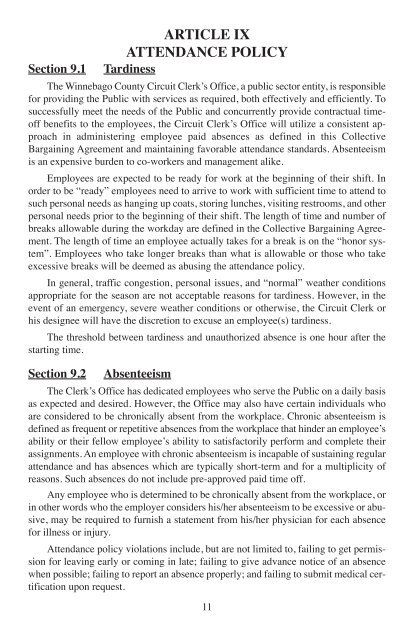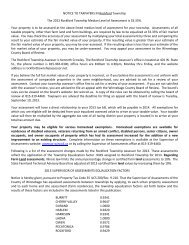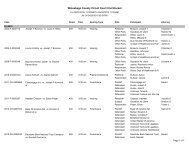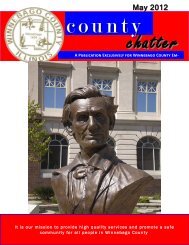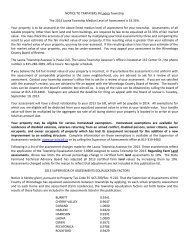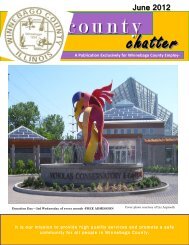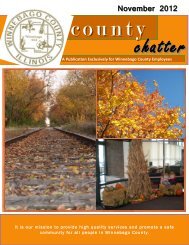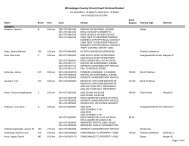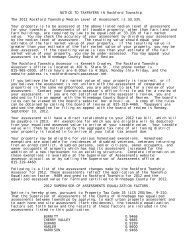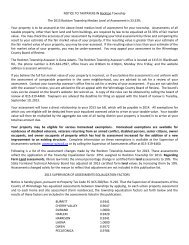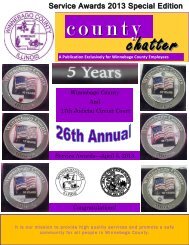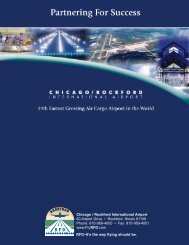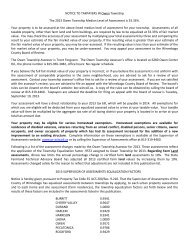2009-2013 Winnebago Agreement: AFSCME Circuit Clerk Local 473
2009-2013 Winnebago Agreement: AFSCME Circuit Clerk Local 473
2009-2013 Winnebago Agreement: AFSCME Circuit Clerk Local 473
Create successful ePaper yourself
Turn your PDF publications into a flip-book with our unique Google optimized e-Paper software.
Section 9.1<br />
ARTICLE IX<br />
ATTENDANCE POLICY<br />
Tardiness<br />
The <strong>Winnebago</strong> County <strong>Circuit</strong> <strong>Clerk</strong>’s Office, a public sector entity, is responsible<br />
for providing the Public with services as required, both effectively and efficiently. To<br />
successfully meet the needs of the Public and concurrently provide contractual timeoff<br />
benefits to the employees, the <strong>Circuit</strong> <strong>Clerk</strong>’s Office will utilize a consistent approach<br />
in administering employee paid absences as defined in this Collective<br />
Bargaining <strong>Agreement</strong> and maintaining favorable attendance standards. Absenteeism<br />
is an expensive burden to co-workers and management alike.<br />
Employees are expected to be ready for work at the beginning of their shift. In<br />
order to be “ready” employees need to arrive to work with sufficient time to attend to<br />
such personal needs as hanging up coats, storing lunches, visiting restrooms, and other<br />
personal needs prior to the beginning of their shift. The length of time and number of<br />
breaks allowable during the workday are defined in the Collective Bargaining <strong>Agreement</strong>.<br />
The length of time an employee actually takes for a break is on the “honor system”.<br />
Employees who take longer breaks than what is allowable or those who take<br />
excessive breaks will be deemed as abusing the attendance policy.<br />
In general, traffic congestion, personal issues, and “normal” weather conditions<br />
appropriate for the season are not acceptable reasons for tardiness. However, in the<br />
event of an emergency, severe weather conditions or otherwise, the <strong>Circuit</strong> <strong>Clerk</strong> or<br />
his designee will have the discretion to excuse an employee(s) tardiness.<br />
The threshold between tardiness and unauthorized absence is one hour after the<br />
starting time.<br />
Section 9.2 Absenteeism<br />
The <strong>Clerk</strong>’s Office has dedicated employees who serve the Public on a daily basis<br />
as expected and desired. However, the Office may also have certain individuals who<br />
are considered to be chronically absent from the workplace. Chronic absenteeism is<br />
defined as frequent or repetitive absences from the workplace that hinder an employee’s<br />
ability or their fellow employee’s ability to satisfactorily perform and complete their<br />
assignments. An employee with chronic absenteeism is incapable of sustaining regular<br />
attendance and has absences which are typically short-term and for a multiplicity of<br />
reasons. Such absences do not include pre-approved paid time off.<br />
Any employee who is determined to be chronically absent from the workplace, or<br />
in other words who the employer considers his/her absenteeism to be excessive or abusive,<br />
may be required to furnish a statement from his/her physician for each absence<br />
for illness or injury.<br />
Attendance policy violations include, but are not limited to, failing to get permission<br />
for leaving early or coming in late; failing to give advance notice of an absence<br />
when possible; failing to report an absence properly; and failing to submit medical certification<br />
upon request.<br />
11


